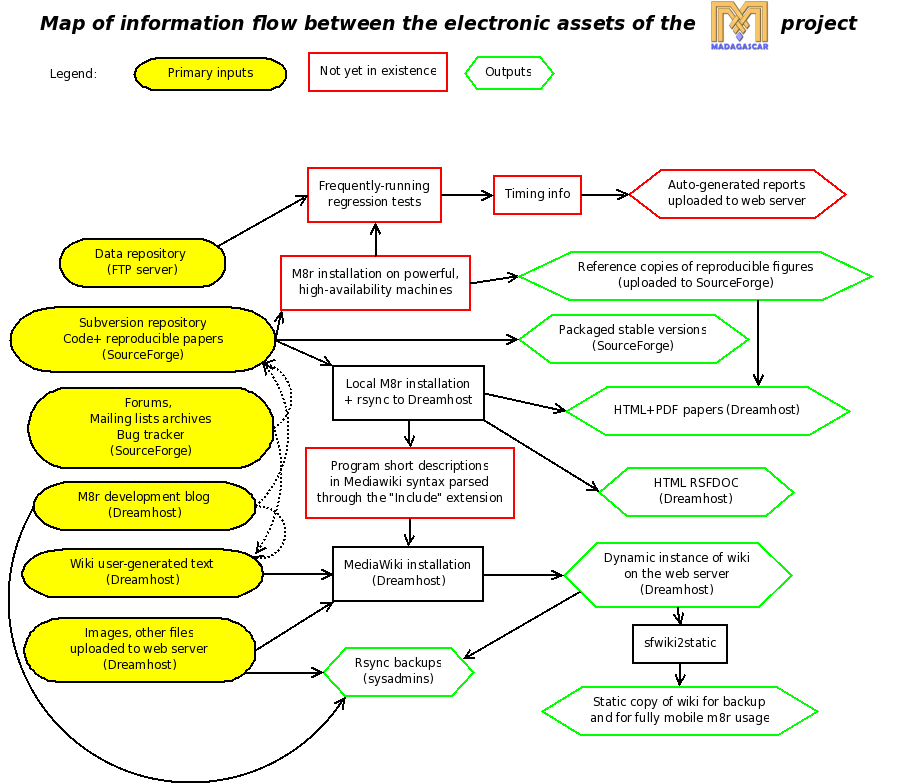Contributing new programs to Madagascar
If you want to share your code with other Madagascar users:
- Follow the guide on Adding new programs to Madagascar.
- If your employer holds the copyright for your software, obtain a permission to distribute under a GPL license and place a copyright and GPL license notice in each file with code.
- Register at SourceForge.
- Find out who the project administrators are (Look for "Project Admins" on this page) and pass your SourceForge user name to one of them.
- Upload your directory to the repository using svn add and svn commit.
- Make sure to add reproducible examples of using your program under the MADAGASCAR/book tree. Create new directories if necessary and commit them to the repository. As a rule, programs without examples are not included in the release version.
Some additional useful information is included below.
Style suggestions
Please try to:
- Do atomic commits.
- Use svn commit -m "your message here" to let others know what changed.
- Alternatively, set the EDITOR or SVN_EDITOR environmental variables to your favorite editor and edit your message there.
- If you plan to do large-scale substantive changes, create a Subversion branch by running
svn copy https://rsf.svn.sourceforge.net/svnroot/rsf/trunk https://rsf.svn.sourceforge.net/svnroot/rsf/yourbranchname svn co https://rsf.svn.sourceforge.net/svnroot/rsf/yourbranchname
Backward compatibility features
If you introduce or notice a feature that is used solely for backwards compatibility with an old version of a dependency, please document it here, so that the feature can be eliminated when the Madagascar community stops supporting that version of that dependency[1].
Python 2.2 and older
- In framework/rsfdoc.py: Everything in the have_datetime_module=False branches
Python 2.3 and older
- In configure.py: Everything in the have_subprocess=False branches
- In configure.py: See code after comment "For Py 2.4 and up this can be done more elegantly..."
- In user/ivlad/ivlad.py: Everything in the have_subprocess=False branches
- The entire api/python/rsfbak.py (also needed on systems which do not have recent versions of numpy and SWIG)
Mitigating missing dependencies
The main idea is to attempt to provide graceful degradation when facing a missing dependency. Quoting the Wikipedia page on fault-tolerant systems, this "enables a system to continue operating properly in the event of the failure of (or one or more faults within) some of its components. If its operating quality decreases at all, the decrease is proportional to the severity of the failure, as compared to a naively-designed system in which even a small failure can cause total breakdown."
SWIG or numpy
Graceful degradation is implemented. Please see the Advanced Installation / Python API for an introduction to this issue. The module providing the limited functionality is api/python/rsfbak.py, which emulates header and command-line parameter reading functions from headers from the "official" API.
cfortran.h
This source code file provides a machine-independent interface between C procedures, Fortran procedures and global data (more details on the website of its initial author). It is a dependency of the F77 and F90 APIs, as well as of vplot. It is included in m8r in two places. Version 4.3 (2002) is still distributed through the website of the original author. Another version (fork?) is maintained at CERN and distributed in the include directory of the interface to event generators in the Monte Carlo libraries in the CERN Program Library (CERNlib). Debian distributes the Free Software part of this package as cernlib. Under Fedora, cfortran.h is included in cernlib-g77-devel and cernlib-devel, which happily overwrite each other's files and create copies of cfortran.h in two different locations deeply nested under /usr/include. CERNlib's Debian maintainer states that "CERNlib is an ancient mass of mostly Fortran code" and that "Most components of CERNLIB are completely broken on modern 64-bit architectures", so m8r developers should be aware that CERNlib will probably be superseded at some point in the future by ROOT, with upstream cfortran.h maintenance possibly continuing this way.
Static code checks
Madagascar contains the beginning of an implementation of static code checks for security vulnerabilities and coding mistakes with Splint. This is visible in the code through the presence of comments like /*@out@*/ and /*@null@*/, which instruct Splint about the intent of different variables and function return values. Future plans include using also dynamic checking by Valgrind or IBM's Rational Purify.
Information flow map
The vector graphics original of this map in Dia format is available upon request through the rsf-devel mailing list.

- ↑ This could be more elegantly done by using a special string to flag a backwards compatibility comment in the code, then have the documentation builder build this list automatically. This would make it more likely for this page to be kept in synch with the codebase.